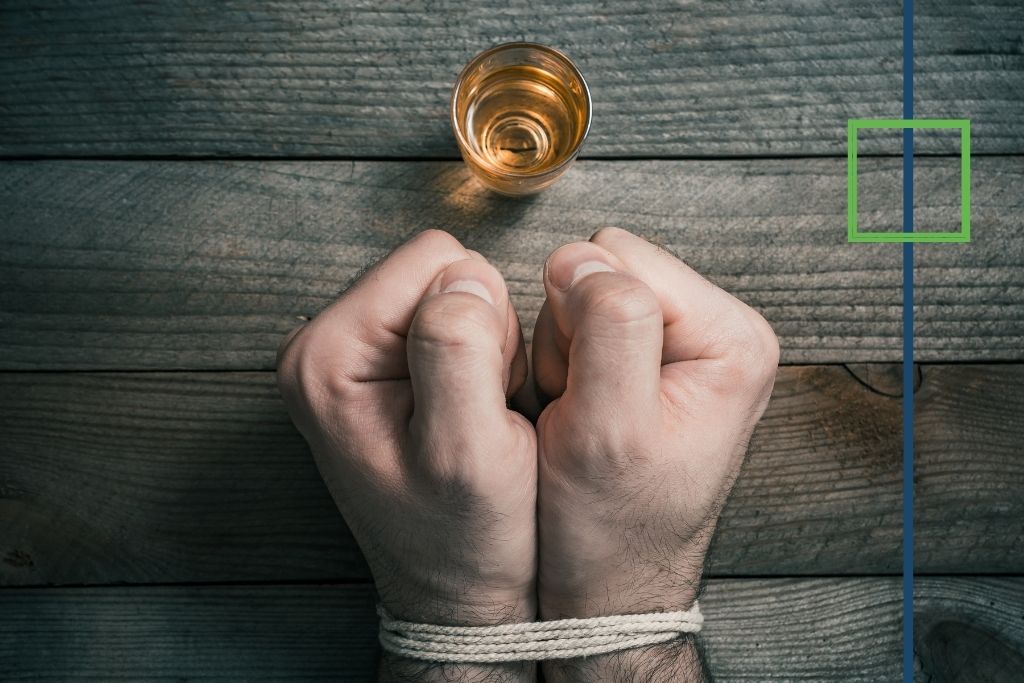Long-term heavy alcohol consumption causes brain abnormalities and damages cognitive functioning. Several terms have been used to describe these effects, including alcohol-related dementia, alcohol-induced dementia, and alcoholic dementia. [1]
Many individuals recognized as having alcohol-related dementia are suffering from the Wernicke–Korsakoff syndrome (WKS). Therefore, diagnostic criteria for ‘substance-induced persisting dementia’ are included in DSM-IV.

Table 4.1.11.1 DSM-IV Diagnostic Criteria for ‘Alcohol-Induced Dementia
A. The development of multiple cognitive deficits manifested by both:
(1) Memory Impairment: Impaired ability to learn new information or to recall previously learned information
(2) one (or more) of the following cognitive disturbances:
(a) Aphasia: Language disturbance
(b) Apraxia: Impaired ability to carry out motor activities despite the intact motor function
(c) Agnosia: Failure to recognize or identify objects despite the intact motor-sensory function
(d) Disturbance in executive functioning (i.e., planning, organization, sequencing, abstracting)
B. The cognitive deficits in criteria A1 and A2 each cause significant impairment in social or occupational functioning and represent a substantial decline from a previous level of functioning.
C. The deficits do not occur exclusively during delirium and persist beyond the usual duration of substance intoxication or withdrawal
D. There is evidence from the history, physical examination, or laboratory findings that the deficits are aetiologically related to the persisting effects of substance use (e.g., a drug of abuse, a medication) [2]

Get Your Life Back
Find Hope & Recovery. Get Safe Comfortable Detox, Addiction Rehab & Mental Health Dual Diagnosis High-Quality Care at the We Level Up Treatment Centers Network.
Hotline (877) 378-4154How Much is Too Much?
‘High levels of alcohol consumption can vary from 10 ‘standard’ drinks a week to more than 9 ‘standard’ drinks a day. Reduced frontal lobe volume has been associated with 418 grams a week but has not been associated with lower consumption levels.
One review suggested that drinking five to six drinks of alcohol per day (which, by U.S. standards, equates to 70 to 84 grams) over extended periods results in ‘cognitive inefficiencies,’. While consumption of 10 or more standard drinks a day shows moderate cognitive deficiencies equivalent to that found in individuals with diagnosed alcoholism. [3]
Signs of Alcohol Induced Dementia
The signs of alcoholic dementia a person exhibits may vary depending on the type of alcohol dementia. Some common symptoms of alcohol dementia include:
- Unexplained changes in personality or character
- Lying without realizing it
- Abnormal eye movement
- Decreased or abnormal reflexes
- Fabricating stories
- Memory loss
- Muscle weakness
- Problems with motor movement and coordination
- Loss of speech
- Difficulties learning
- The trouble with complex problem-solving
- Getting lost on familiar paths
- Difficulties completing simple tasks, like following a cooking recipe
- Confusion regarding the place or time the person is in
- Problems appropriately stringing sentences or words together
Long-Term Health Risks
According to CDC, [4] over time, excessive alcohol use can also lead to the development of chronic diseases and other serious problems, including:
- High blood pressure, heart disease, stroke, liver disease, and digestive issues
- Cancer of the breast, mouth, throat, esophagus, voice box, liver, colon, and rectum
- Weakening of the immune system, increasing the chances of getting sick
- Learning and memory problems, including dementia and poor school performance
- Mental health problems, including depression and anxiety
- Social issues, including family problems, job-related issues, and unemployment
- Alcohol use disorders, or alcohol dependence.
By not drinking too much, you can reduce these long-term health risks.
Get Help. Get Better. Get Your Life Back.
Searching for Accredited Drug & Alcohol Rehab Centers Near You? Or Mental Health Support?
Even if you have failed previously, relapsed, or are in a difficult crisis, we stand ready to support you. Our trusted behavioral health specialists will not give up on you. Call us when you feel ready or want someone to speak to about therapy alternatives to change your life. Even if we cannot assist you, we will lead you wherever you can get support. There is no obligation. Call our hotline today.
FREE Addiction Hotline – Call 24/7Indications of Alcoholism
For others, the psychological or social elements lead to alcohol addiction and alcoholism. You may drink in social situations to calm down or loosen up. Others use alcohol to deal in their everyday lives with psychological problems and stress.
The misuse of alcohol and alcohol in families may also occur. Genetics, however, does not ensure an alcohol problem. In addition, the exact causes of alcohol abuse and alcoholism are often unknown.
It would be best if you didn’t attempt to drive or operate heavy machinery while under the effects of alcohol.
The Symptoms of Alcoholism include:
- A strong desire or craving to drink
- An inability to control cravings
- An inability to stop drinking
- Increased tolerance for alcohol
- Lying about drinking
- Attempting to drink without others knowing
- A failure to get through everyday activities without drinking
The Symptoms of Alcohol Abuse include:
- Drinking to relax
- Driving under the influence of alcohol
- Problems with family and friends because of drinking
- Neglecting responsibilities
- Having legal problems because of alcohol
People who abuse alcohol may deny a problem, but there are ways to identify alcohol abuse in others. People who use alcohol may drink often and experience family, work, or school problems because of drinking. However, they may downplay their drinking or lie about the amount of alcohol they drink.
Many people with alcoholism resume drinking even if they develop health problems. Loved ones sometimes discern an issue before an alcoholic does. Firstly, the person dependent on alcohol must recognize their pain. Unless the person realizes that they have a problem, treatment will not be successful. The person will not take treatment seriously and most likely will not benefit from the treatment offered. Above all, for life-long sobriety, we will need your commitment.
Comfortable Facilities & Amenities
High-Quality Addiction & Mental Health Rehabilitation Treatment
Rehab Centers TourRenowned Addiction Centers. Serene Private Facilities. Inpatient rehab programs vary.
Addiction Helpline (877) 378-4154Proven recovery success experience, backed by a Team w/ History of:
15+
Years of Unified Experience
100s
5-Star Reviews Across Our Centers
10K
Recovery Success Stories Across Our Network
- Low Patient to Therapist Ratio
- Onsite Medical Detox Center
- Comprehensive Dual-Diagnosis Treatment
- Complimentary Family & Alumni Programs
- Coaching, Recovery & Personal Development Events
When To Ask For Help
Alcohol-related dementia should be recognized as a preventable condition. However, identification is hampered by a lack of clarity in terminology and a lack of standardized and specialized screening instruments and assessment procedures.
These individuals make repeated use of Accident and Emergency Departments, general medical, and long-stay wards. Therefore, early identification would reduce their need for these services. Abstinence is the key to recovery.
The Stages of Alcoholism Treatment
Addiction treatment isn’t as easy as taking a pill and waiting for the effects to kick in.
Most treatment programs favor a step-down process, starting with a strict and restrictive environment and gradually phasing down to help those in recovery assimilate into daily life.
- Detox: Detox is the first stage of treatment, lasting around three to seven days based on substance. In detox, users go through drug withdrawal to move past the physical components of addiction. For those with long-term or severe substance abuse, medications and other therapies are available to minimize side effects.
- Inpatient: Patients reside in an inpatient care facility with limited access to the outside world for three to four weeks following detox. During this time, patients work with counselors and other addiction professionals in individual and group settings to facilitate healing, effective coping mechanisms, and a healthy attitude toward sobriety.
- Partial Hospitalization: Also known as PHP, partial hospitalization programs are outpatient programs that provide a balance between inpatient and outpatient care. In this time, recovering users live in a sober living house while attending addiction programming during the day, five days a week.
- Intensive Outpatient: After several weeks or months of PHP, users graduate to intensive outpatient programs or IOP. In the evenings, three to five days a week for several hours, these programs give patients a chance to return to work or school while remaining committed to the recovery community. Moreover, participants often live in a sober house during IOP.
- Outpatient: After IOP is complete, many recovering users return to their homes and families and attempt to re-enter everyday life. However, remaining active in the recovery community is highly advisable, and many individuals continue attending outpatient addiction treatment programs to maintain sobriety best.
World-class, Accredited, 5-Star Reviewed, Effective Addiction & Mental Health Programs. Complete Behavioral Health Inpatient Rehab, Detox plus Co-occuring Disorders Therapy.
CALL (877) 378-4154End the Addiction Pain. End the Emotional Rollercoaster. Get Your Life Back. Start Drug, Alcohol & Dual Diagnosis Mental Health Treatment Now. Get Free No-obligation Guidance by Substance Abuse Specialists Who Understand Addiction & Mental Health Recovery & Know How to Help.
Inpatient Rehab Treatment Center

We Level Up NJ Treatment Center team is determined to provide a solid foundation for addiction recovery. Our team of treatment experts helps each client get a strong start at a sober life through our alcohol detox and drug detox programs, followed by inpatient treatment. At every level of care, we incorporate medical and alternative therapies for a holistic experience. Above all, we support the transition from active addiction to recovery from the very start of the process. In addition, our treatment program is to help manage the detox process and reduce relapse rates across the board.
Our treatment center is guaranteed one of the best drugs and alcohol rehab centers, providing custom inpatient rehab center programs to fit the needs of each individual.
Research shows that the most effective way to help someone with a substance use problem who may be at risk for developing a substance use disorder is to intervene early before the condition can progress.
Contact us today to find out how to help you get started on the road to recovery, and avoid alcohol-induced dementia.
Experience Transformative Recovery at the We Level Up Treatment Center.
See our authentic success stories. Get inspired. Get the help you deserve.



Start a New Life
Begin with a free call to an addiction & behavioral health treatment advisor. Learn more about our dual-diagnosis programs. The We Level Up treatment center network delivers various recovery programs at each treatment facility. Call to learn more.
- Personalized Care
- Caring Accountable Staff
- Comfortable Amenities
- Licensed & Accredited
- Renowned w/ 5-Star Reviews
We’ll Call You
Sources:
[1-2] Alcohol-related dementia – Oxford University Press
[3] Alcohol-related dementia: an update of the evidence – National Center for Biotechnology Information, U.S. National Library of Medicine
[4] Alcohol Use and Your Health – Centers for Disease Control and Prevention





